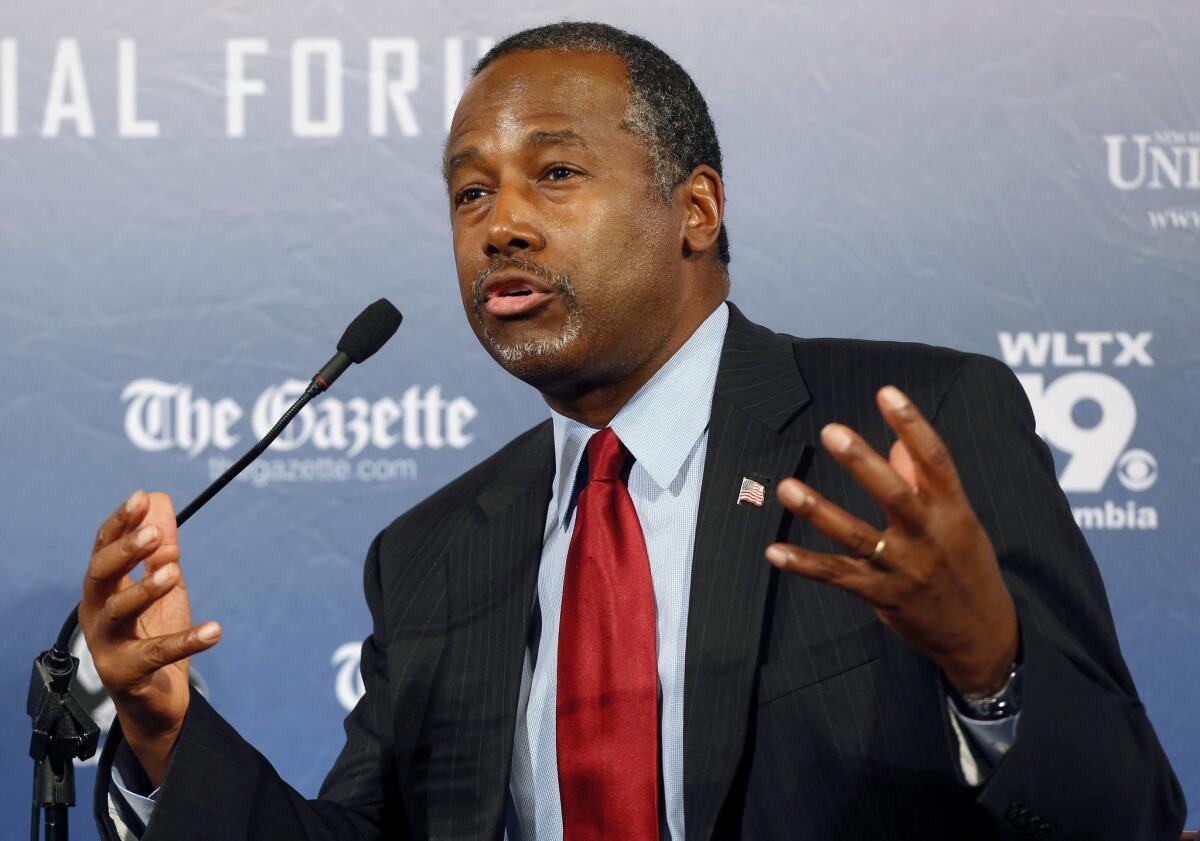Op-Ed: The Founding Fathers say Ben Carson is wrong about a Muslim president

Republican presidential candidate Ben Carson, a devout Christian, said in a recent interview that Islam is antithetical to the Constitution and he doesn’t believe that a Muslim should be elected president. Above, Carson speaking in New Hampshire in August.
- Share via
When GOP presidential hopeful Ben Carson told an interviewer that he “would not advocate that we put a Muslim in charge of this nation,” he revived a debate as old as the Constitution.
The issue in the late 1700s was exactly how inclusive a newly pluralistic American society would be. Many Americans considered someone who subscribed to the Islamic faith, then widely referred to as a “Mahomaden” or a “Turk,” as the ultimate outsider.
And yet the Constitution prohibited any religious test for those wishing to hold public office, theoretically allowing any citizen to serve in the federal government. Writing to Thomas Jefferson in October 1788, James Madison summarized one of the major objections to the Constitution on exactly these grounds: “By prohibiting religious tests [the Constitution would] open a door for Jews, Turks and infidels.”
For Jefferson, however, as for most of the founders, the opening of a door to religious minorities was a positive thing, the very mark of our democracy’s success. Jefferson’s 1786 Virginia Statute for Religious Freedom had affirmed “that all men shall be free to profess ... their opinions in matters of religion, and that the same shall in no wise diminish, enlarge, or affect their civil capacities.” And George Washington, in a 1790 letter to American Jews, wrote that “the government of the United States gives to bigotry no sanction, to persecution no assistance.”
Still, anxieties over the role of religious minorities troubled Americans. As documented in Denise A. Spellberg’s “Thomas Jefferson’s Qur’an: Islam and the Founders,” during the ratification debates over the Constitution, the role of Muslims in the new republic became a litmus test for the country’s ability to live up to its ideals. State legislatures across the country debated whether a “Mahomaden” should ever be allowed to hold office in the United States — though, unlike Jews and Catholics, who had actually inhabited the Colonies, barely any Muslims were known to live in the United States at the time.
The debate was particularly pointed in the North Carolina Legislature. The anti-Federalist Baptist minister and delegate Henry Abbot argued that, were the Constitution ratified, “Mahometans might obtain offices among us, and that the senators and representatives might all be pagans.” Responding to Abbot, Federalist James Iredell explained that America’s new experiment in democracy had “set an example to mankind ... that a man might be of different religious sentiments from our own, without being a bad member of society.”
The Federalists ultimately won the argument, convincing Americans that the very values that drove the country toward revolution — “life, liberty and the pursuit of happiness” — also mandated a Constitution that aspired, at least in theory, to equality for all its citizens regardless of religion. The Constitution was ratified including Article VI, which unambiguously declares “no religious test shall ever be required as a qualification to any office or public trust under the United States.”
And yet old anxieties have persisted. Roman Catholic presidential candidate John F. Kennedy had to answer anti-Catholics in a famous 1960 speech, reassuring voters that he believed “in an America that is officially neither Catholic, Protestant nor Jewish.”
Now Ben Carson is channeling the fears of millions of Americans who believe that there is something inherently suspicious about Islam.
Nearly 1 in 5 states have banned Sharia, or Islamic law, from state courtrooms, despite the American Bar Assn.’s vehement condemnation of such legislation as unnecessary and, in its blanket approach to a single religion, counter to American principles. Still, the anti-Sharia movement is alive and strong.
Indeed, after more than a decade of wars in the Middle East, Americans’ negative perceptions of Islam are on the rise. According to one 2015 poll, more than 50% of Americans had an unfavorable view of Islam. According to another poll in 2014, nearly 2 in 3 Republicans reported a negative view of American Muslims. Among Democrats, 1 in 3 held negative views.
These negative perceptions of Islam help explain why Carson reinforced his statement about Muslims. “Muslims feel that their religion is very much a part of your public life and what you do as a public official,” he said in a second interview “and that’s inconsistent with our principles and our Constitution.”
Even when he was prodded to walk back his comments, Carson couldn’t get very far. He told a third interviewer that candidates from “a Muslim background” who were “willing to reject those tenets” could gain his support. Then he added: They would be “considered infidels and heretics” — in other words, not Muslims at all.
Perhaps Carson really believes that Muslims are less deserving of positions of responsibility in our society. Perhaps he is merely pandering to frightened voters. What is clear, however, is that he’s treading on long-settled territory about Americans’ freedom to practice their religion without discrimination or fear.
As Thomas Jefferson declared in his first inaugural address, “Having banished from our land that religious intolerance under which mankind so long bled and suffered, we have yet gained little if we countenance a political intolerance.”
Carson would do well to take note.
Andrew Burt is a visiting fellow at Yale Law School’s Information Society Project and the author of “American Hysteria: The Untold Story of Mass Political Extremism in the United States.”
Follow the Opinion section on Twitter @latimesopinion and Facebook
More to Read
A cure for the common opinion
Get thought-provoking perspectives with our weekly newsletter.
You may occasionally receive promotional content from the Los Angeles Times.









